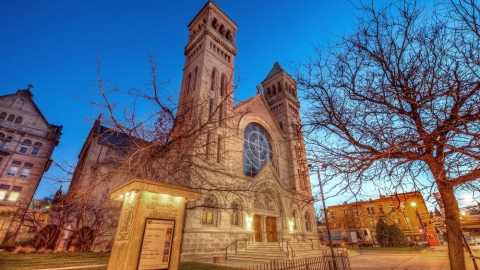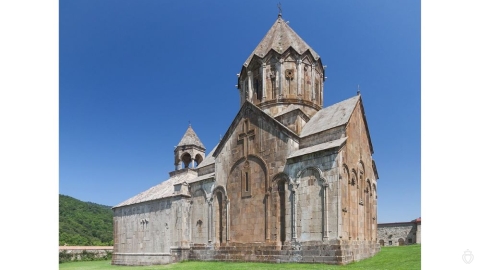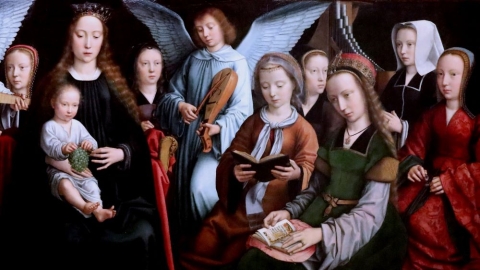St. Ambrose : Mary, Mirror of Virgins

Bartolomeo Suardi (Bramantino) : Madonna and child with Saint Ambrose and Saint Michael
St. Ambrose (339-397) was at first an administrator, brought up, when he was only a catechumen, from the civil government of Milan to the episcopal see. He was an astute psychologist and a contemplative
This energetic Latin went to the school of the Greek Fathers to learn Christian doctrine. He had deep and very soft overtones, as well as high mystical views, very original among the Westerners of his time. The following text is taken from the second book of De Virginibus – a treatise addressed to virgins and dedicated to his sister Marcellina, a religious sister in Rome.
7. The first thing which kindles ardour in learning is the greatness of the teacher. What is greater than the Mother of God? What more glorious than she whom Glory Itself chose? What more chaste than she who bore a body without contact with another body? For why should I speak of her other virtues? She was a virgin not only in body but also in mind, who stained the sincerity of its disposition by no guile.
She was humble in heart, grave in speech, prudent in mind, sparing of words, studious in reading, resting her hope not on uncertain riches, but on the prayer of the poor, intent on work, modest in discourse; wont to seek not man but God as the judge of her thoughts, to injure no one, to have goodwill towards all, to rise up before her elders, not to envy her equals, to avoid boastfulness, to follow reason, to love virtue.
13. Though she was the mother of the Lord, yet she desired to learn the precepts of the Lord, and she who brought forth God, yet desired to know God.
15. This is the likeness of virginity. For Mary was such that her example alone is a lesson for all. If, then, the author displeases us not, let us make trial of the production, that whoever desires its reward for herself may imitate the pattern.
How many kinds of virtues shine forth in one Virgin! The secret of modesty, the banner of faith, the service of devotion, the Virgin within the house, the companion for the ministry, the mother at the temple.
16. Oh! how many virgins shall she meet, how many shall she embrace and bring to the Lord, and say: “She has been faithful to her espousal, to my Son; she has kept her bridal couch with spotless modesty.”
How shall the Lord Himself commend them to His Father, repeating again those words of His: “Holy Father, these are they whom I have kept for Thee, on whom the Son of Man leant His head and rested; I ask that where I am there they may be with Me.” (Jn. 17:24) And if they ought to benefit not themselves only, who lived not for themselves alone, one virgin may redeem her parents, another her brothers. “Holy Father, the world hath not known Me, but these have known Me, and have willed not to know the world.” (Jn. 17:25)
17. What a procession shall that be, what joy of applauding angels when she is found worthy of dwelling in heaven who lived on earth a heavenly life! Then too Mary, taking her timbrel, shall stir up the choirs of virgins, singing to the Lord because they have passed through the sea of this world without suffering from the waves of this world. (Ex. 15:20)
Then each shall rejoice, saying: “I will go to the altar of God; to God Who maketh my youth glad;” (Ps 43, 4) and, “I will offer unto God thanksgiving, and pay my vows unto the Most High.” (Ps. 50:14)
18. Nor would I hesitate to admit you to the altars of God, whose souls I would without hesitation call altars, on which Christ is daily offered for the redemption of the body.
For if the virgin’s body be a temple of God, what is her soul, which, the ashes, as it were, of the body being shaken off, once more uncovered by the hand of the Eternal Priest, exhales the vapour of the divine fire. Blessed virgins, who emit a fragrance through divine grace as gardens do through flowers, temples through religion, altars through the priest.
Taken from: Les plus beaux textes sur la Vierge Marie, by. Fr. Pie Régamey
(Source : Régamey – FSSPX.Actualités)
Illustration : Flickr / Jean Louis Mazières (CC BY-NC-SA 2.0)





